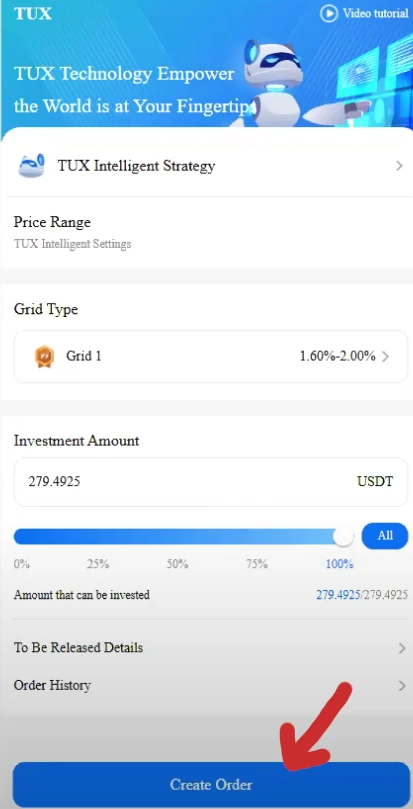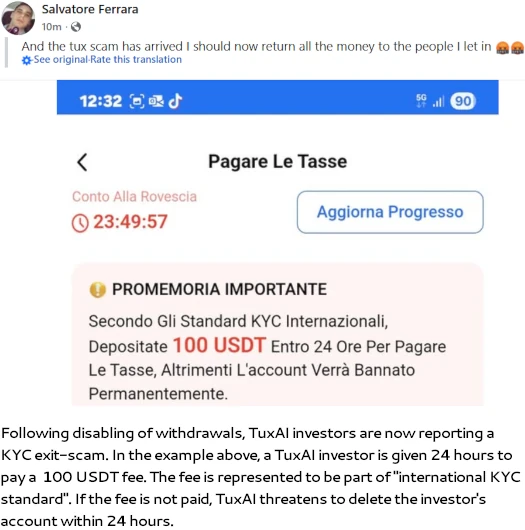TuxAI Review: AI ruse “click a button” app Ponzi
 TuxAI fails to provide ownership or executive information on its website.
TuxAI fails to provide ownership or executive information on its website.
TuxAI operates from four known website domains:
- tuxai.com (already abandoned) – registered in May 2020, private registration last updated on December 29th, 2023
- tuxail.com (already abandoned) – registered in May 2023, private registration last updated on January 13th, 2025
- tux8.com – app website, registered in May 2017, private registration last updated on August 20th, 2024
- tuxtop.com – marketing website, registered in May 2014, private registration last updated on June 21st, 2024
TuxAI has already attracted the attention of regulators. On January 29th, 2025 Italy’s CONSOB issued a TuxAI securities fraud warning.
As a result of confirmed securities fraud, TuxAI’s known websites were ordered blocked in Italy.
Update 8th March 2025 – TuxAI continues to defraud Italian consumers. CONSOB has blacklisted two additional TuxAI website domains in a March 6th follow-up fraud warning:
- tuxitu.com – registered with bogus details on February 9th, 2025
- tuxamity.com – registered with bogus details on February 5th, 2025
/end update
As always, if an MLM company is not openly upfront about who is running or owns it, think long and hard about joining and/or handing over any money.
TuxAI’s Products
TuxAI has no retailable products or services.
Affiliates are only able to market TuxAI affiliate membership itself.
TuxAI’s Compensation Plan
TuxAI affiliates invest tether (USDT). This is done on the promise of returns as high as 4% a day.
TuxAI pays referral commissions on invested USDT down three levels of recruitment (unilevel):

- level 1 (personally recruited affiliates) – 12%
- level 2 – 4%
- level 3 – 2%
Joining TuxAI
TuxAI affiliate membership is free.
Full participation in the attached income opportunity requires an undisclosed minimum investment in tether (USDT).
TuxAI Conclusion
TuxAI is yet another “click a button” app Ponzi scheme.
TuxAI’s Ponzi ruse is baloney about AI robots mixed with trading.
TUXAI combines AI and grid technology to significantly improve automated trading efficiency and decision-making quality.
The presented ruse is TuxAI affiliates log in and click a button to start “missions” (the more invested the more the button needs to be clicked).

Clicking the button purportedly generates revenue via fictional AI robots executing fictional trade orders.

If that makes no sense it’s because it doesn’t. Even if TuxAI’s trading robots existed, clicking a button in an app to generate revenue through the robots makes no sense.
In reality clicking a button inside TuxAI’s app does nothing. All TuxAI does is recycle newly invested funds to pay earlier investors.
TuxAI is part of a group of “click a button” app Ponzis that have emerged since late 2021.
Examples of recently collapsed “click a button” app Ponzis using the same AI ruse are AI Profit USDT, Nexus666 and AI Robots.
Since 2021 BehindMLM has documented hundreds of “click a button” app Ponzis. Most of them last a few weeks to a few months before collapsing.
“Click a button” app Ponzis disappear by disabling both their websites and app. This tends to happen without notice, leaving the majority of investors with a loss (inevitable Ponzi math).
As part of a collapse, “click a button” Ponzi scammers often initiate recovery scams. This sees the scammers demand investors pay a fee to access funds and/or re enable withdrawals.
If any payments are made withdrawals remain disabled or the scammers cease communication.
Organized crime interests from China operate scam factories behind “click a button” Ponzis from south-east Asian countries.
In September 2024, the US Department of Treasury sanctioned Cambodian politician Ly Yong Phat over ties to Chinese human trafficking scam factories.
Through various companies he owns, Phat is alleged to shelter Chinese scammers operating out of Cambodia.
Myanmar claims to have deported over 50,000 Chinese scam factory scammers since October 2023. With “click a button” app scams continuing to feature on BehindMLM though, it is clearly not enough.
In late January 2025, Chinese ministry representatives visited Thailand. The stated aim of the visit was to tackle organized Chinese crime gangs operating from Myanmar.
Regardless of which country they operate from, ultimately the same group of Chinese scammers are believed to be behind the “click a button” app Ponzi plague.
Update 7th October 2025 – TuxAI has collapsed. From around October 5th TuxAI investors have been reporting withdrawals have been disabled.
A “KYC” exit-scam is currently in place, with TuxAI seeking milk investors for a final 100 USDT a pop:

It’s expected Tux’s websites will be disabled once the exit-scam has run its course.


Tux’s websites are still up but a reader wrote in to advise withdrawals have been disabled. Unconfirmed at this stage.
edit: Tux’s collapse confirmed, will update the review with information.